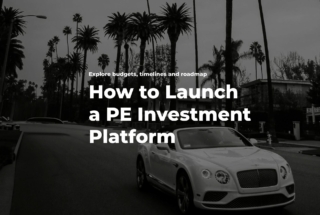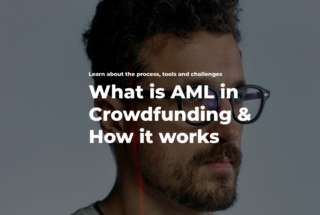Taxes in Crowdfunding: What You Need to Know
Crowdfunding platforms, investors and fundraisers — all need to pay income taxes whether it’s in the USA, UK or Europe.
Let’s have a closer look at what types of taxes are applied to these parties and what opportunities can be used to reduce the taxation burden.
What you will learn in this post:
Crowdfunding platforms, legal entities and taxes
Smaller or newly established crowdfunding platforms such as FarmFundr, for example, are normally registered as Limited Liability Companies, while the established platforms such as StartEngine Crowdfunding Inc are Corporations with LLCs registered for separate tasks.
Taxes paid by crowdfunding platforms
Crowdfunding platforms are businesses created with the aim to receive income. In the US, all crowdfunding portals need to register with the IRS and pay taxes such as:
- Income tax – the annual income tax return shall be filed by all businesses except partnerships. The federal income tax is paid every time when a business gets some income.
- Employment tax – a crowdinvesting business has employees whom it pays a salary. So, a crowdfunding platform is obliged to pay employment taxes that include Social Security and Medicare taxes, federal income tax withholding, and federal unemployment tax.
Crowdfunding platform tax obligations and filing requirements are different depending on the business type and legal entity.
Along with federal and state taxes, platforms are responsible for reporting on the distribution of money raised by a project if the sum exceeds the threshold of $600.
In this case, a crowdfunding platform or a payment processor is required to fill in Form 1099-K, Payment Card, and Third Party Network Transactions. The platform also sends a copy of Form 1099-K to the project owner for whom the money was raised.
Taxes paid by fundraisers
According to the balance, not all crowdfunding income is taxes. With donation crowdfunding, fundraisers do not provide any financial return to the investors, so the donations can be regarded as gifts and don’t need to pay taxes.
Even though fundraisers don’t pay any taxes in this case, investors still may pay a gift tax. If a gift value exceeds $16,000 per year, this gift is subject to the gift tax. The gift tax rate varies from 18% to 40% depending on the gift sum.
When investors fund a reward-based crowdfunding campaign, they expect something in return. So, any funds raised in a reward-based campaign are regarded as crowdfunding taxable income. Usually, crowdfunding proceeds are included in gross income if the tax law doesn’t exclude them.
Taxes paid by investors
In equity-based crowdfunding, businesses do not offer goods or services to the investors but issue securities or shares in return for the invested funds. That’s why such funds are not considered business income and are not subject to business taxes. Instead of business taxes, capital gains are taxed.
For example, one share costs $100 at the moment when the funds were raised in a crowdfunding campaign. After some years, the share value grows to $300. If the investor sells the share, his income will be $200, and this income is called a capital gain.
Capital gains are taxed differently depending on the holding period. If the investor held the share for one year or less, they pay the tax as for the ordinary income. If the share is held for more than one year, the investor pays the tax based on the preferential capital gains rates. In such cases, the maximum of 20% only can be applied.
In some debt crowdfunding campaigns, investors may get convertible notes which can be turned into equity later. After the note is converted into equity, the investor starts receiving dividends and should pay the taxes. Investors use a schedule K-1 form to report on the income, deductions, etc.
Investing in convertible notes has its drawbacks, too. The dividends are paid on maturity at least annually, but the IRS considers that the investor has been receiving the dividends all the time while they were holding a convertible note. This may require startups to issue a Form 1099-OID for each investor.
Possibilities to reduce taxes for investors
Both taxes on capital gains and taxes on dividends can be very high. That’s why investors look for opportunities either to reduce the tax rate or to receive a break on investment taxes.
One of the ways to reduce the tax amounts is to invest in an Opportunity Zone.
Opportunity Zones are low-income census tracts that are nominated by governors and certified by the U.S Department of the Treasury. Those who invest in such zones receive a break on the capital gain tax.
Investors that choose Opportunity Zones for their funds shall consider that their investment is going to be locked for a period from five to ten years. The longer the money is kept the smaller tax rate on the capital gains is applied. Those investors who provide their money for ten years, won’t have to pay any capital gain tax.
Investing in crowdfunded ventures might be a wonderful way to make your self-directed IRA or Solo 401(k) retirement plan work. However, it might be difficult to select the right crowdfunding campaign to invest in.
So, participating in crowdfunding campaigns raising funds for the construction of new property for sale will create an obligation to pay tax on Unrelated Business Taxable Income (UBTI). The top end tax on UBTS can be 37%. That’s why it is better to avoid investing in such ventures or invest only with a professional firm.
The ownership of shares in a company that pays dividends to its investors doesn’t have the UBTI tax exposure.
Final thoughts about taxes in crowdfunding
Taxation in crowdfunding is complicated and has many details to consider. Whether you’re building your crowdfunding platform, investing or raising capital, you should consult with a tax professional.
Starting your investment crowdfunding platform
If you’d like to start a crowdfunding portal and need white-label investment platform software, check out LenderKit.
With LenderKit, you can launch your crowdinvesting business much easier and less time-demanding because we provide a set of basic crowdfunding platform features and can fully adjust the portal to fit your business needs.
Using LenderKit white-label investment platform will enable you to track and monitor investment data, set up notifications, and manage your crowdfunding campaigns under Reg CF, Reg A/A+, or Reg D or alternatives in European or muslim countries.
For more information, reach out to our fintech strategist and schedule an online demo.




